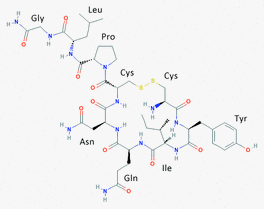Oxytocin hormone promotes herd behaviour in people
 Spraying oxytocin – also known as the ‘love hormone’ – into people’s noses encourages them to adopt the opinion of their peers, according to a study led by researcher <link people mirre-stallen>Mirre Stallen from Erasmus University. It turns out that this human hormone helps to determine to what extent individuals identify with other people and their ideas. In short, oxytocin promotes group conformity.
Spraying oxytocin – also known as the ‘love hormone’ – into people’s noses encourages them to adopt the opinion of their peers, according to a study led by researcher <link people mirre-stallen>Mirre Stallen from Erasmus University. It turns out that this human hormone helps to determine to what extent individuals identify with other people and their ideas. In short, oxytocin promotes group conformity.
PhD candidate Mirre Stallen found the effect when male participants were asked to judge the beauty of randomly-chosen and neutral abstract figures. In forming their opinion, men who had first received a dose of oxytocin were strongly influenced by what others in the group thought.
After receiving a nasal spray containing oxytocin or a placebo, the men were asked to assess the beauty of the figures. While viewing them, the men were also shown the opinion of other participants, from their own group and from another group.
Men who had been given oxytocin adjusted their judgement to better match the opinion held by group members. They liked a figure better if others felt the same, but were more negative about it if the group gave it the thumbs-down. Remarkably, no such effect was noticed when an opinion was expressed by people outside the own group.
The oxytocin hormone is best known for its role in childbirth and breastfeeding. However, recent research demonstrates that oxytocin also heavily influences social behaviour in both sexes. This finding has been confirmed by the new study, which shows that oxytocin, a neuropeptide, has a great impact on everyday behaviour. The researchers believe that this hormone played a major role during human evolution by cementing group cohesion.
The researchers of Erasmus University Rotterdam, Radboud University Nijmegen and the University of Amsterdam have published their findings in their paper The Herding Hormone, Oxytocin Stimulates In-Group Conformity in the scientific journal Psychological Science.
- Interested in neuroeconomics? Visit the <link research centres neuroeconomics _blank>Erasmus Centre for Neuroeconomics.

